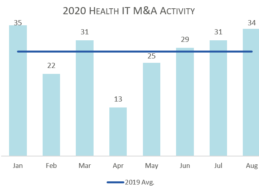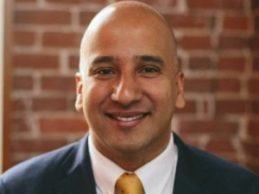– Healthcare Growth Partners’ (HGP) summary of Health IT/digital health mergers & acquisition (M&A) activity, and public company performance during the month of August 2020.
M&A is back and the velocity of the rebound has outpaced all expectations. The recovery quickly worked its way across the spectrum from large to small-cap, beginning with the larger cap NASDAQ rally of nearly 80% from lows in late March (only to soften in recent days), followed by multi-billion
Read More
How Data Silos Are Ruining the Modern Healthcare Industry
With new administrative requirements and an increasingly competitive market, the job of a healthcare professional is no longer just about providing care to patients. In fact, healthcare professionals now spend an average of 10 hours per week on paperwork and administrative tasks, according to a 2018 survey from Medscape. This can be frustrating, and it’s only compounded when healthcare workers have to enter the same exact information over and over again—a tedious reality for many healthcare
Read More
How the Simple Telehealth Visit Will Revolutionize Care Delivery and Disease Management
The impact of COVID-19 on the healthcare industry’s ability to innovate has been stunning. We have seen FDA emergency authorizations and relaxed regulatory guidelines enable the development of radical new ventilator ideas, accelerated timelines for vaccine development, and an extraordinary transition to telehealth services. Many of these actions were a response to the exposure of weak spots in our healthcare system, but even as those weaknesses have been shored up (in large part due to public
Read More
How Can Health IT Address Socially Determined Risk amid COVID-19?
Many have argued that the COVID-19 pandemic is a “black swan”: a catastrophic event that can only be understood with the benefit of hindsight. While there is some appeal to this observation, the originator of the black swan theory, Naseem Taleb, strongly refutes this assertion. He counters that COVID-19 was a “white swan”—a predictable event with predictable consequences.
New federal data shows that Latinos and African Americans living in the US are three times as likely to become
Read More
How The Cloud Will Revolutionize Your Healthcare Network
Advances in medical devices have greatly improved healthcare but many of these devices are not living up to their full potential. As things stand, too many of these devices only help to provide care. Instead, they must be integrated with cloud computing to upload valuable data to hospital networks, where practitioners and management teams can access it to gain context, make better decisions, further enhance patient care and improve return on investment (ROI).
Adding objective context
No
Read More
Why EHR Interoperability is Critical for Telehealth
Telehealth has recently taken off as a way to prevent the spread of the novel coronavirus, but even though telehealth has been around for several years, clinics had difficulty adopting it pre-COVID-19. This caused clinics to not view telehealth as a viable option, and it was often seen as a last resort approach to healthcare.
As reducing the spread of COVID-19 became paramount, Medicare and Medicaid were forced to develop telehealth service codes, and clinics were tasked with finding an
Read More
Maximizing Telehealth Success: How to Optimize Operations & Revenue Cycle Management
In COVID-19’s wake, providers’ financial recovery will be crucial yet daunting. U.S. hospitals and health systems stand to collectively lose $36.6 billion between March and June 2020 alone. Physician practices also face serious financial challenges as they recoup revenues that declined up to 55 percent and patient volume that decreased 60 percent.
Amid these hardships, telehealth has emerged as a widely accepted vehicle for care delivery – providing a way for healthcare organizations to
Read More
How Contactless Technologies Can Propel Healthcare Towards the Future
With the continued spread of COVID-19, health organizations around the world are accelerating their adoption of tech solutions that mitigate the need for physical contact between healthcare providers and patients. Contactless innovations like automated robots and the Internet of Things (IoT) not only reduce the spread of disease in medical facilities, though; they also have the potential to improve overall organizational performance due to their advanced data-collecting and protecting
Read More
The Coronavirus Crisis’ Silent Death Toll: Chronically Ill Patients
The impact of the coronavirus crisis is shining a bright light on many of the challenges facing the U.S. healthcare system.
So much more than a lack of primary care physicians and hospital beds, the all-hands-on-deck approach to combating the spread of COVID-19 has forced patients fearful of engaging with the healthcare system for needs unrelated to the virus to put elective procedures, routine care and timely treatment for chronic or critical conditions on the back burner.
Compounding
Read More
Why International Expansion Must Remain a Priority for Cerner, Epic, Allscripts, MEDITECH
What You Should Know:
- How the top US acute EHR vendors, namely Cerner, Epic, Allscripts, and MEDITECH (+85% share of US acute market in terms of revenues), have progressed on international expansion.
As highlighted below, there is a significant variance amongst the big four in terms of revenue and share of business outside the US. Cerner has by far the highest revenue at more than $650M in 2019, representing 12% of its business. Whilst MEDITECH has considerably lower revenue than
Read More










